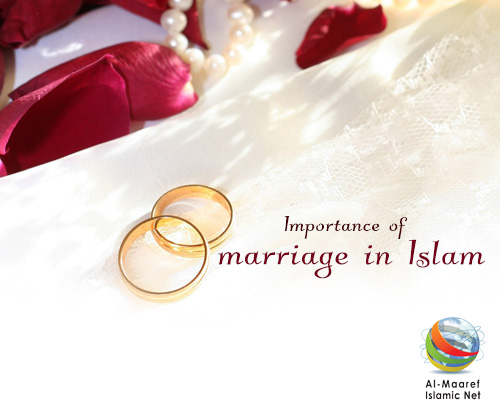1- Islam and Human Inclinations
Islam ordains that we should fulfill our natural instincts and inclinations. It is mentioned in many traditions that human beings have no right to suppress their natural instincts and emotions under false notions of morality.
The Quran says that just as a person should be concerned about his hereafter, he should also be concerned about his worldly life. He should also be concerned about his natural inclinations and emotions.
﴾And seek the abode of the hereafter in that which Allah hath given thee and neglect not thy portion of the world, and be thou kind even as Allah hath been kind to thee, and seek not corruption in the earth; Lo! Allah loveth not corrupters.﴿ (Sura al Qasas 28:77)
This means that you should utilize whatever wealth and status Allah has bestowed on you to prepare for your hereafter. But remember that you should not ignore your worldly needs in the process. You should strike a balance between the two and not lean overly to one side. Getting totally absorbed with worldly matters only is not desirable. Similarly, dedicating one’s wealth, health, youth and wisdom only for the hereafter too is not required of a person.
During the time of the Prophet (peace be upon him and his household) and his vicegerents, some people had adopted a misguided way. They wrongly thought that a person has to think only of the hereafter all the time and that the world should be shunned. They believed that they should abstain from the natural and legitimate instincts. But when the Prophet (peace be upon him and his household) and the Imams (a.s.) learnt of this erroneous view, they opposed it strongly.
The author of Wasail quotes one tradition thus: Three women approached the Prophet (peace be upon him and his household) one day. One of them said, “O Prophet! My husband has shunned the company of his wife.” The second said, “My husband has stopped eating meat!” The third said, “My husband has stopped using perfume!” Hearing the women, the Prophet (peace be upon him and his household) was upset. He saw that misguided ideas were beginning to take root amongst his followers. Although it was not the time for any mandatory prayer, he proceeded to the mosque. He went in such a great hurry that even his cloak was not properly placed on his shoulder and one end of it was touching the ground. He ordered the people to assemble in the mosque. People rushed there leaving aside their tasks. The Prophet (peace be upon him and his household) ascended the pulpit and said,” I have heard that my companions are getting wrong ideas.” He added, “I am Allah’s Messenger, I eat meat and delicious food! I wear good clothes! I wear perfumes and keep the company of my wives and have conjugal relations with them! Whosoever opposes my ways is not my follower!” The Prophet (peace be upon him and his household) has repeated this sentence on several occasions: ‘One who does not adopt my ways is not a Muslim’.
There is another anecdote similar to this one, quoted by Faydh Kashani in al-Saafi. This proves the point that the need was very much felt to repeat this important instruction. Once when a verse pertaining to the retribution for sinners in the hereafter was revealed, some believers got very scared and started abstaining from worldly necessities and pleasures. Faydh records that once a woman came to Bibi Ayesha for some errand. Although the woman was married, she was devoid of the normal embellishments married women generally wear. Hadhrat Ayesha asked her, “Has your husband expired?” She replied in the negative and said that he had left home and retired to the wilderness with two of his friends for prayer and penance in loneliness. She also said that he had vowed to have no conjugal relations with her. One of her husbands’ friends’ had vowed not to eat good food. The third friend had vowed not to keep social contact with others. Bibi Ayesha related this conversation to the Holy Prophet (peace be upon him and his household).
The Prophet (peace be upon him and his household) was very upset with the actions of the three men. This tradition, too, quotes that the Prophet hurried to the mosque in such a state that his cloak was not properly draped over his shoulder. Although it was not yet time for salah, he went to the mosque. He asked people to assemble in the mosque and addressed them from the pulpit. “I have heard that misguided ideas are taking root in the minds of the Muslims. I have heard that some Muslims have retired to the hills and caves to busy themselves in prayers. They do not maintain relations with their wives, they do not eat good food and abstain from meeting people socially. I, your Prophet, do eat good food and keep affectionate relations with my spouses! Faman raghiba an sunnati falaisa minni One who abandons my ways is not from me!Every person who obstructs the growth of progeny, who avoids marrying and spends all his time in prayer is not a Muslim.” This was the way of the Holy Prophet as well as that of the Infallible Imams.
It is recorded in history that when Amir al Mu’minin (a.s.) entered the Mosque of Kufa for the first time, he found some persons busy offering prayers although it was not yet the time for mandatory prayers. When he enquired about them, he was told that they were ‘Rijal al Haq’ - the People of the Truth!The Imam (a.s.) asked, “Who are these Rijal al Haq?” The reply was, “These are the persons who have forsaken the world. They eat, if they get some food to eat. Otherwise they starve and keep praying in the mosque!” Hadhrat Ali (a.s.) was angry at hearing this. As recorded by Asad al Ghaba, he flogged those people and said, “Don’t set wrong examples for the Muslims! Your practice is un-Islamic!” Then he added in anger, “Even dogs live like you. If someone takes pity on them and gives some food, they eat. Otherwise, they keep starving.” Then Hadhrat Ali (a.s) had them thrown out from the mosque.
At the time when Hadhrat Ali (a.s.) had assumed the temporal Caliphate, he visited Basra. He visited the house of one of the elite persons of the city and objected to the pomp and show on display there. In order to evade Hadhrat Ali (a.s.)’s question, the person changed the subject and said, “O Amir al Mu’minin (a.s.)! I have a brother who lives like a hermit. He avoids all company and has forsaken the world. He sits in one place praying all the while!” Imam (a.s) left the opulent person alone because now a more important issue had occupied his attention. He sent for the brother and asked, “Why have you forsaken the world?” The person replied, “O Ali! I see you and I want to be like you!”
Imam Ali (a.s.) said, “No! You cannot be like me! I am the chief of the Muslims and the chief must adopt the standard of living of the most downtrodden of the Muslims! For you, the correct way is to adopt the middle path. You should not forsake the world. You must toil to earn a fair livelihood. You must adopt a progressive way of life so that you live contentedly with your wife and children!” In the twelfth chapter of the book Wasail al Shia,there are many traditions of the Imams (a.s.)that condemn procrastination and laziness and exhort Muslims to engage in hard work.
One person came to Imam Jafar al-Sadiq (a.s.) and said, “O Hadhrat! I have grown very old and have no work. I sit in a corner of the mosque and keep remembering the hereafter! I keep praying!” The person had assumed that the Imam (a.s.) would appreciate and praise his actions. On the contrary, three times the Imam (a.s.) said, “Hadha min amal ash Shaitan” - This is not an act of a human being! This is not the way of a Muslim! This is the way of Satan. Satan has succeeded in his stratagem that is why you have forsaken the world and busied yourself only in prayer!The man asked, “O son of the Prophet (peace be upon him and his household)! Then what should I do?”
The Imam (a.s.) replied, “As long as you have strength in your body and limbs, continue to do work that can benefit you and your family! If you don’t have sufficient work, then help your neighbors and relatives.” Then the Imam added, “Yes! But you must ensure that you don’t sacrifice your hereafter for worldly gains! As soon as the time for a mandatory prayer arrives, leave all else and offer the prayer! Pray when it is time for prayer, and work when it is time for work!”
I would like to say some words about Amir al Mu’minin (a.s.), and I want the young boys and girls to keep in their minds what I am saying. The biographers of Hadhrat Amir al Mu’minin have recorded that he was a lion by day and a supplicant (Abid) at the night. At the time of prayer his dedication would be complete and while at work he would toil so hard that innumerable oases for the benefit of the society are credited to him during the twenty-five years of his working life. He always helped the poor, weak and disabled persons. We should remember that shunning the company of others and suppressing legitimate desires is not allowed in Islam. Islam permits its followers to have legitimate desires and to strive for their fulfillment.
Experience shows and even the psychologists will tell you that people who live in isolation, people who shun the world, the youth who can marry but do not, over a period of time their desires descend to the subconscious and these people fall prey to psychological diseases. Once a person is under this psychological pressure he becomes worse than a dog if he were to get any power or authority. If he does not have any power or authority he becomes disheartened, and presents a very morose and gloomy appearance. Such people are unable to socially interact with others. The society shuns them. They may not be economically depressed but are psychologically incapable of taking on the responsibilities of a family. Such men become a source of trouble for themselves and their wives and such ladies remain depressed and it is to be borne in mind that depressed people cannot raise children effectively.
The people who are unable to shoulder the responsibilities of married life, those whose hearts have hardened because of committing sin after sin, fit the following description given by the Holy Quran:
﴾Lo! The worst of beasts in Allah’s sight are the deaf, the dumb, who have no sense﴿ (Sura al-Anfal 8:22).
Those who have brains but do not think are worse than beasts. They are worse than dogs and the impure (najis) animals. Some people stifle their sexual instinct, while others stifle their natural religious inclination. Both these type of people invite grief and disappointment. The Holy Quran says about such a person that he possesses eyes but he cannot see, he has ears but he cannot hear, he owns a heart but is unable to understand. Such a person is like a wild animal or even worse than that. He paves the way to Hell for himself.
﴾Already have we urged unto Hell many of the jinn and humankind, having hearts wherewith they understand not, and having eyes wherewith they see not, and having ears wherewith they hear not. These are as the cattle—nay, but they are worse! These are the neglectful﴿. (Sura al-’Araf 7:179).
This means that a group prepares itself for hell. Their hereafter is Hell. These are the people whose religious instinct has been stifled. Their naturally endowed instinct of searching for God has become extinct. Curbing the religious instinct, of course, is a sin. Suppressing ones sexual instinct, depriving oneself of food, isolating oneself from the society etc. are things which can reach the subconscious level. When this happens it becomes a barrier to perfection. Then it is very difficult to get that person back on track.
2- Life Under Islamic Purview
Islam categorizes human life into three distinct types:
1- Basic life
2- Comfortable life
3- Luxurious life
Basic Life
The basic life is one in which a person is self sufficient in terms of food, clothing and shelter. If a person provides these basic requirements for himself and his family, he becomes deserving of rewards from Allah. Later on we shall see that a man who strives hard to provide livelihood for his family and a woman who toils hard at the home to provide comfort to the family deserve a reward equivalent to performing Jihad in the way of Allah.
The person who strives to provide for his family is like the Mujahid who performs Jihad in the way of Allah . Wasail Shia- Vol 12, Page 43
If a person is capable of working for his own upkeep, it is obligatory (wajib) for him to work and not be a burden to others. If a person has the strength to work and provide livelihood to his wife and children but is lazy and neglects his duty, it is prohibited (haram) for him to be lazy and neglectful. The rights of a wife are among the important rights that have been mentioned in Islam. Therefore, if a person is able bodied to earn the essentials of life, then it is crucial and obligatory to acquire these with his own toil. But if a person is disabled, sick or infirm, then it is the responsibility of the Islamic government to provide for his needs. If the Islamic government is unable to do so, then all Muslims are obliged to help all those in need of help.
There is a verse of the Holy Quran which, in the Holy month of Ramadan everyone, particularly the ladies, must bear in mind. The verse reads:
﴾Let him who has abundance, spend of his abundance, and he whose provision is measured, let him spend of that which Allah hath given him. Allah asketh naught of any soul save that which He hath given it.﴿ (Sura al Talaaq 65:07).
Quran says that it is essential for every human being that he must take care of his needs and the needs of others within his means. This would mean that if a person has the means of maintaining ten persons, or twenty persons, he should look after them. But if a person cannot maintain ten people, he should be charitable according to his means. He should reduce a morsel from his own iftar and help others with it. Similarly he should give one of his dresses to clothe a needy person. If we ponder upon this verse, we realize that all of us have the means to be charitable. The Prophet of Islam (peace be upon him and his household) gave a sermon on the last Friday of the month of Shabanand reminded the people that everyone should be concerned about others. They should arrange food for the breaking of the Ramadan fasts.This instruction is especially for those whohave the means to do so. One of the listeners of the sermon got up and asked the Prophet (peace be upon him and his household): “O Prophet of Allah! What should be done by those who don’t have the means to serve food for the breaking of the fasts?” The Prophet (peace be upon him and his household) said, “Feed others even if it is just with a single dry date or a sip of water!” This tradition should not be taken literally to mean that one should offer a single date for iftar and keep count of the number of dates he has given, and when this number reaches a thousand the person thinks that he has given a thousand iftaris. It means that one should serve his fellow men according to ones means. The person who has the means to help others should do so and the person who cannot help others should do whatever he can. Has Allah provided you with iftar? Yes? Then share this iftar with others to the best of your ability. Self-sacrifice is an altogether different topic that is not a part of our discussion today. Today we are discussing that acquiring the essentials of life is mandatory for everyone according to Islam. It is incorrect for a person to be so immersed in worship that he does not acquire the essentials of life. It is also incorrect that a certain section of the society eats and drinks while the poor have to suffer the pangs of hunger.
Comfortable Life
Islam appreciates comfortable life for the people. During the time of the Prophet (peace be upon him and his household) some people started indulging in a wrong practice. They began to avoid the consumption of good food. It was then that the following verse of the Holy Quran was revealed:
﴾Say: who hath forbidden the adornment of Allah which He hath brought forth for his bondsmen, and the good things of His providing?﴿ (Sura al-’Araf 7:32)
O Muslims! Whatever Allah has provided in this world is for you so that your life is pleasant and comfortable! Then, why do you deny good food to yourselves? Why don’t you marry? Why do you choose not to have children?
Allah says that whatever is there in the world is for you. If the unbelievers eat it is also because of you. Actually, it has been created for you. Heaven has also been created for you, but regarding Heaven, the unbelievers will not even be able to smell its fragrance. This verse shows us that Islam desires a comfortable life for everyone, for all mankind. Those who can provide a pleasant life for their families must do so! Those who can contribute to the comfort of the society and their relatives must do so. Islam permits man to live a comfortable existence in the world. .
Islam has a very effective economic system. It is a pity that while there is plenty of water in the cistern, we, the Muslims, remain thirsty! Islam has a wonderful law called the ‘Qanoone Mawasaat’or the law of mutual cooperation.Under this law the Muslims are required to cooperate and help each other. But we have forgotten this law. Many a time the Prophet (peace be upon him and his household) used to express his regret from the pulpit that his Ummawould ignore the Law ofMawasaat after him. All Muslims must lead comfortable lives. One who deprives himself of a comfortable life, on purpose, is committing a forbidden act according to the Holy Quran. Shunning comforts of life is tantamount to being stubborn. Man should avoid being stubborn and mould his life according to the norms laid down by the Holy Quran. He should not be a slave to his own whims and fancies. He must refer to the examples set by the Prophet (peace be upon him and his household) and the Imams (a.s.) as his role models for life.
We see that the widows dress in black for the rest of their lives. Quran says that this is a wrong attitude. Such a thing has not been prescribed by the Quran; people have made it up themselves. Some widows refuse to consider marriage. If someone mentions that she should have a husband, she becomes upset. The Quran says that it is wrong for her to become upset. This is a type of stubbornness, and is against the teachings of the Quran and the infallible Imams. We see eligible young men avoiding matrimony, inspite of being able to marry. We see that a young girl rejects the proposals that are made to her saying that there is no hurry. Have they asked their sexual instinct whether there is any hurry or not? Ask those hormones that circulate in your blood whether there should be hurry or delay. Ask the Holy Prophet whether you should marry or delay marriage, in your present condition. The Prophet of Islam (peace be upon him and his household) has said, “Marriage is my Sunnat and one who avoids my sunnat is not from me.”
The girl who prefers to remain a spinster and the young widow who refuses remarriage and the man who remains a bachelor are, according to the Islamic Shariah, not (good) Muslims. Here I would like to say a word of advice to the young men and women that you should not impose your desires and your thoughts on Islam. Instead you must find out what Islam prescribes, you should find out what the Holy Prophet and the Infallible Imams have said, you should find out what your Marja and those who know about Islam say. Acting in matters of Islamic Shariahaccording to your own inclinations is a grave sin. If someone perpetrates innovations in the matters of Islam, all muslims and especially the erudite scholars are required to raise their voices against such acts. A tradition says that if wrong thoughts or wrong beliefs begin to circulate in the ummat, it is necessary for the erudite scholars to protest. If they do not do so, Allah’s curse will be on them.
Luxurious Life
A life of luxury and lavishness is not desirable in Islam. Islam condemns such life when its practitioners adopt it. Islam condemns becoming a slave to fashion, heavy use of products of beautification, expensively decorated homes and wearing of designer and expensive dresses. Islam does not want people to have big desires. Do not desire for more and more. When you have a wife, you should not desire another wife. Spend enough to live in comfort. Quran condemns the expensive way of life in strong terms:
﴾And when We would want to destroy a township We sent commandments to its folk who live at ease, and afterwards they commit abomination therein, and so the word (of doom) hath effect for it, and We annihilate it with complete annihilation.﴿ (Sura al-’Isra’ 17:16)
The Holy Quran says that if a community indulges in a life of luxury, then it will certainly get destroyed. This type of life encourages them to indulge in forbidden acts. The above verse pertains to the way of life of communities. But we are now quoting verses from Sura al Waqiah that deal with the way of life of individuals:
﴾And those on the left hand: What of those on the left hand?In scorching wind and scalding water And shadow of black smoke, Neither cool nor refreshing, Lo! Heretofore they were effete with luxury﴿. ( Sura al Waqiah, 56: 41-45)
The Holy Quran says that the people on the left are very ashamed. Who are these people? They are the ones who are facing retribution of the Hellfire. They are those who indulged in sin after sin! Then Quran asks: Why do people indulge in sin after sin? It is extravagance, and indulging in luxury that drag a person towards sin. This is the reason that the Holy Quran has ordained:
﴾Eat and drink but don’t waste﴿ ((Sura al-’Araf 7:31)
* Islamic Family-Life Ethics by Ayatullah Hussain Madhahiri, Section 2.




















